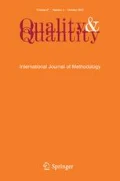Abstract
Poverty can either be measured directly, through standards of living such as material deprivation, or indirectly through resources available, usually income. Research shows that the optimum measure of poverty combines these methods, a fact that the UK government took cognisance of in its tripartite measure of child poverty. For use in a birth cohort study, two methods of calculating material deprivation were tested: the method used by the UK government taken from the Family Resources Survey (FRS), and the methods used in the Poverty and Social Exclusion (PSE) study at Bristol University. Results show that the former measure, compared to the latter measure, underestimates the depth and extent of material deprivation among families with young children in Scotland.
Similar content being viewed by others
References
Alcock, P.: Understanding Poverty. Macmillan, Basingstoke (2006)
Barnes, M., Chanfreau, J., Tomaszewski, W.: Growing up in Scotland: The Circumstances of Persistently Poor Children. Scottish Government, Edinburgh (2010)
Bradshaw, J., Finch, N.: Overlaps in dimensions of poverty. J. Soc. Policy 32, 513–525 (2003)
Bradshaw, P., Marryat, L., Corbett, J., Ferrandon, M., Tipping, S.: Growing up In Scotland Sweep 4: 2008–2009: User Guide. Scottish Government, Edinburgh (2009)
Callan, T., Nolan, B., Whelan, C.T.: Resources, deprivation and the measurement of poverty. J. Soc. Policy 22, 141–172 (1993)
Chanfreau, J., Burchardt, T.: Equivalence scales: rationales, uses and assumptions. Scottish Government, Edinburgh (2008)
Desai, M., Shah, A.: An econometric approach to the measurement of poverty. Oxf. Econ. Pap. 40, 505–522 (1988)
Ghiselli, E.E., Campbell, J.P., Zedeck, S.: Measurement Theory for the Behavioral Sciences. W. H. Freeman, San Francisco (1981)
Gordon, D., Pantazis, C.: Breadline Britain in the 1990s. Ashgate, Aldershot (1997)
Government, S.: Poverty and income inequality in Scotland: 2008–09. In: Statistics, N. (ed) Scottish Government, Edinburgh (2010)
Harris, J., Treanor, M.C., Sharma, N.: Below the Breadline: A Year in the Life of Families Living in Poverty. Barnardos, London (2009)
HBAI.: Households Below Average Income: An analysis of the income distribution 1994/5–2010/11. In: Adams, N., Carr, J., Collins, J., Johnson, G., Matejic, P. (eds) London, Department for Work and Pensions (DWP) (2012)
Kline, T.: Psychological Testing: A Practical Approach To Design And Evaluation. Sage Publications, Thousand Oaks (2005)
Lister, R.: Poverty. Polity, Malden (2004)
Mack, J., Lansley, S.: Poor Britain. G. Allen & Unwin, Oxford (1985)
Mckay, S.: Poverty or preference: what do ‘consensual deprivation indicators’ really mean? Fiscal Stud. 25, 201–223 (2004)
Pantazis, C., Gordon, D., Levitas, R.: Poverty and Social Exclusion in Britain: The Millennium Survey. Policy Press, Bristol (2006)
Piachaud, D.: Children and Poverty. Child Poverty Action Group, London (1981)
Ringen, S.: Direct and indirect measures of poverty. J. Soc. Policy 17, 351–365 (1988)
Scotcen, : Growing up in Scotland Sweep 4–2008/09 Data Documentation. Scottish Centre for Social Research, Edinburgh (2008)
Smith, N., Middleton, S.: A Review of Poverty Dynamics Research in the UK. Joseph Rowntree Foundation, York (2007)
Townsend, P.: Poverty in the United Kingdom: A Survey of Household Resources and Standards of Living. Penguin, Harmondsworth (1979)
Townsend, P.: Deprivation. J. Soc. Policy 16, 125–146 (1987)
Whelan, C.T., Layte, R., Maitre, B.: Understanding the mismatch between income poverty and deprivation: A dynamic comparative analysis. Eur. Sociol. Rev. 20, 287–302 (2004)
Acknowledgments
I would like to thank the Economic and Social Research Council (ESRC) for the funding for my PhD (award number ES/HO13008/1) at the University of Edinburgh. I would like to thank my supervisors, Professor Kay Tisdall and Dr. Paul Norris for their support. I would also like to give my special thanks to Professor David Gordon for providing me with the details on how to undertake the analysis using the PSE method pioneered at Bristol University.
Author information
Authors and Affiliations
Corresponding author
Rights and permissions
About this article
Cite this article
Treanor, M.C. Deprived or not deprived? Comparing the measured extent of material deprivation using the UK government’s and the Poverty and Social Exclusion surveys’ method of calculating material deprivation. Qual Quant 48, 1337–1346 (2014). https://doi.org/10.1007/s11135-013-9838-0
Published:
Issue Date:
DOI: https://doi.org/10.1007/s11135-013-9838-0




